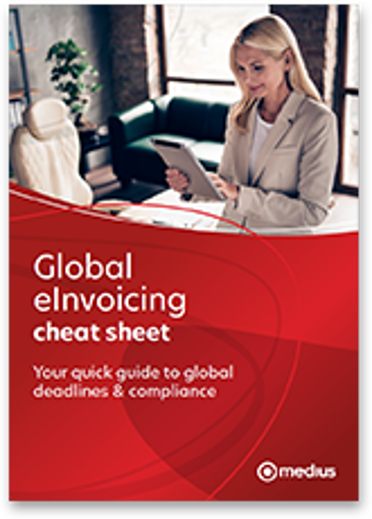

A Partner Dematerialisation Platform (PDP) is a government-certified third-party service provider that can manage electronic invoicing between businesses and government systems. It’s especially important in countries where governments require businesses to send invoices digitally to tax authorities for real-time or near-real-time validation and compliance. PDPs make it easier for businesses to securely send, convert, report, and store electronic invoices (e-invoices) while staying on top of ever-changing tax regulations.
While PDPs are best known in France due to the country’s leading e-invoicing mandate, their role isn’t limited to one place. Many countries with e-invoicing laws use similar accredited platforms—sometimes called by different names—with the same purpose: ensuring secure, compliant digital invoice exchanges between businesses and government tax systems.
Keep up with global tax rules with this handy eInvoicing cheat sheet. It’s packed with a visual map of mandates, country-specific timelines, and easy tips to help you avoid fines.
Why are PDPs important?
The evolution of traditional paper or PDF invoices to mandatory digital e-invoicing fundamentally transforms tax compliance, financial operations, and supply chain transparency. Governments worldwide are pushing e-invoicing to:
Improve tax collection accuracy
Cut down on VAT and invoice fraud
Speed up transaction monitoring and reporting
Modernize and automate fiscal systems
Provide real-time or near-real-time tax data
For businesses, this means keeping up with different technical requirements in each country, ensuring invoices are accurate, and meeting tight submission deadlines. Managing all this manually is nearly impossible—especially for global companies.
PDPs are a solution — platforms accredited or certified by governments or tax authorities to act as trusted intermediaries that:
- Receive, validate, and convert e-invoices into government-approved formats
- Submit invoices and related reports to tax authorities or central platforms
- Exchange invoice data with other PDPs or platforms when trading partners use different providers
- Securely archive invoice data and provide audit trails
- Help companies comply with evolving regulatory demands efficiently
Medius is a French PDP Partner
What does a PDP do?
PDPs handle the secure exchange of electronic invoices and related documents like credit and debit notes. They track the entire invoice process—sent, received, accepted, rejected, and paid—giving you real-time visibility into the invoice flow.
Countries accept invoices in specific electronic formats. Commonly approved formats include:
- Factur-X (France): A hybrid format combining PDF and XML
- UBL 2.1 (Universal Business Language): Widely used in Europe
- UN/CEFACT CII (Cross Industry Invoice): A global standard
PDPs take incoming invoices from older or proprietary formats and convert them into legal standards, making sure different systems can work together seamlessly.
PDPs report invoice and transaction data to tax authorities per legal requirements. This may include:
- Cross-border transactions
- Business-to-government (B2G) invoices
- Business-to-consumer (B2C) e-reporting
- VAT declarations
Heard of the EU’s VAT Digital Age Package?
PDPs make it easy to exchange invoices, even if trading partners use different providers. Thanks to interoperability agreements and standardized protocols, everything stays legally compliant without interrupting your business workflows.
PDPs use strict security measures, including:
- Encryption to protect data during transmission
- Digital signatures to ensure authenticity
- Secure storage and archiving
- Role-based access to keep data limited to the right people
These steps keep your data safe and make sure there’s no fraud or tampering.
How does a PDP work?
A PDP is a middleware service that connects a company’s ERP or invoicing system with the government tax platform. The workflow typically involves:
Creating the invoice
The supplier generates an invoice using their ERP or invoicing software.
Sending it to the PDP
The invoice is sent electronically to the certified PDP platform.
Checking and formatting
The PDP checks the invoice format, ensures the data is complete and accurate, and converts it into the required legal format if needed.
Sending to the government
The PDP forwards the invoice data to the government’s central platform (like France’s PPF).
Sharing with the buyer’s PDP
If the buyer has a different PDP, the two platforms work together to deliver the invoice and share status updates.
Tracking and updates
The PDP monitors whether the invoice is accepted, rejected, or paid and keeps everyone in the loop with updates.
Storing everything
All invoice data and related communications are safely archived for audits and compliance.
This process ensures invoices follow local laws, use a standard format, and give governments the info they need for tax control.
Who should use a PDP?
Any business operating in or trading with a country requiring digital invoice reporting should consider working with a certified PDP (or the local equivalent). This includes:
- Enterprises with French subsidiaries or customers
- Global companies operating in multiple regulatory environments
- Suppliers issuing large volumes of B2B, B2G, or cross-border invoices
- Finance teams looking to standardize invoicing processes across markets

Benefits of using a PDP
Stay compliant
With global e-invoicing mandates, using a certified PDP ensures invoices meet all government regulations, avoiding costly fines and penalties.
Simplify processes
PDPs automate complex format conversions, reporting, and cross-border invoice handling.
Improve data accuracy
Automated validations reduce errors and rejections, speeding up payment cycles.
Enhance transparency
Real-time status tracking and reporting improve financial control and audit readiness.
Support growth
Businesses expanding internationally can manage invoicing under multiple regulatory regimes through one platform.
PDPs in a global e-invoicing landscape
While the French government’s adoption of PDPs brought this concept to prominence, similar frameworks exist worldwide as countries enforce e-invoicing mandates.
Key countries with PDP-like systems:

France
Starting in 2026, France mandates using PDPs certified by the French tax administration. PDPs connect to the Portail Public de Facturation (PPF), France’s public invoicing portal.

Italy
Uses the Sistema di Interscambio (SDI), where certified intermediaries (akin to PDPs) transmit and validate invoices in real-time.

Mexico
Authorizes PACs (Authorized Certification Providers) to instantly validate and transmit electronic invoices (CFDI).

India
Employs Invoice Registration Portals (IRPs) under GST regulations for invoice validation.

Saudi Arabia
Through ZATCA, certified service providers enable electronic invoicing with stringent certification phases.
PDPs and regulatory compliance: the French case study
In France, the Partner Dematerialisation Platform (PDP) plays a key role in the country’s national e-invoicing system. Certified by the French tax authority (DGFiP), PDPs help drive the mandatory B2B and B2G e-invoicing reforms set to roll out in 2026. Here’s what PDPs do:
- Send invoices and e-reporting data to the Portail Public de Facturation (PPF)
- Handle approved invoice formats like Factur-X, UBL 2.1, and UN/CEFACT CII
- Track invoice lifecycles, providing status updates (e.g., received, paid)
- Ensure systems and PDPs work smoothly together with full interoperability
- Validate and enhance invoice data for accuracy and completeness
France e-invoicing timeline:
| Year | Milestone |
|---|---|
| 2026 | Large companies begin mandatory e-invoicing via PDPs |
| 2027 | Mid-sized companies must comply |
| 2028 | Full implementation for all businesses |
Key dates for e-invoicing in France:
September 1, 2026
For large enterprises and intermediate-sized enterprises (ETI).
September 1, 2027
For small and medium-sized enterprises (PME), as well as micro-enterprises.
Starting from September 1, 2026, all companies must be capable of receiving electronic invoices.
FAQs for PDPs
No. The government platform (like France’s PPF) acts as the official tax authority’s portal. PDPs are private or third-party certified providers that connect businesses to the government portal, adding value through validation, conversion, and secure transmission.
In countries mandating e-invoicing via PDPs, bypassing them is not compliant. In some regions, direct submissions to government platforms are possible but often limited and less secure.
Yes. PDPs handle B2B, B2G, B2C, and cross-border invoices, depending on local regulations.
No. While mandates often start with large enterprises, smaller companies eventually become subject. Using a PDP early can ease compliance transitions.
Most PDPs offer integrations or APIs to connect with ERP, accounting, or invoicing software, enabling automation and seamless workflows.

The future of PDPs and e-invoicing
The push for digital tax compliance is only going to grow:
- More countries will start requiring certified intermediaries, like PDPs.
- Data exchange will get more detailed, covering richer transactional and tax data.
- AI and machine learning will play a bigger role in validating invoices and spotting fraud.
- Blockchain and distributed ledgers could boost invoice security and traceability.
- Standardizing e-invoicing will help make cross-border trade easier.
For businesses, teaming up with a reliable, certified PDP provider is a smart move to stay ahead in digital transformation and compliance.
Medius is a PDP Partner in France
Medius is a certified Partner Dematerialisation Platform (PDP) approved by the French Tax Authority (DGFiP), designed to help businesses stay on top of France’s e-invoicing and e-reporting rules. Built for mid-sized and large companies, Medius uses AI-powered automation and compliance know-how to simplify your invoice and expense processes.
With Medius, you get:
Accurate invoice capture (99.7%)
Fast, automated invoice matching
Ready-to-use ERP connectors
AI tools for fraud detection and supplier communication
Real-time reporting and insights
Centralized, secure payments
Simplified expense management via Expensya


